
Wednesday, June 28, 2006
Monday, June 26, 2006
If one picture is worth a thousand words...

Yesterday was our 12th wedding anniversary. People still call us "honeymooners", in the best sense of the word.

This is the last blog about my trip to Mexico. I figure pictures can say it better than I can. I've put the names of folks from my church but not the children, out of concern for privacy.
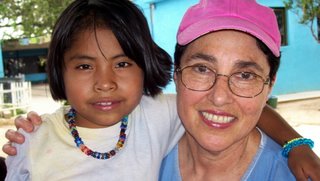
Joan.
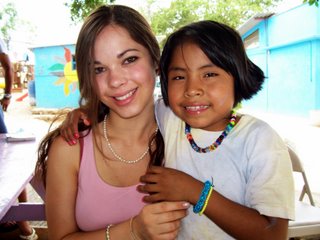
Kristen.
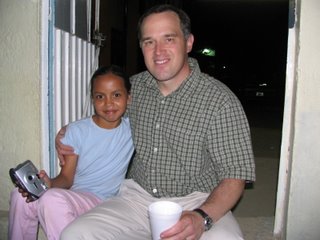
Our pastor, Pete.

Kristen Graves of Simply Smiles, Carol and Francisco, directors of Casa Hogar, and Bryan Nurnberger, founder of Simply Smiles.
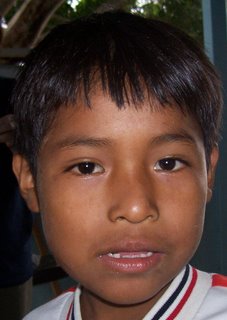
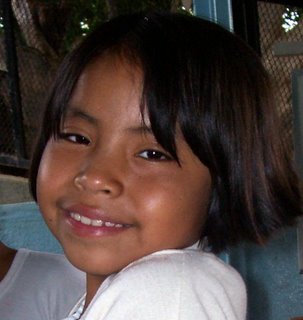
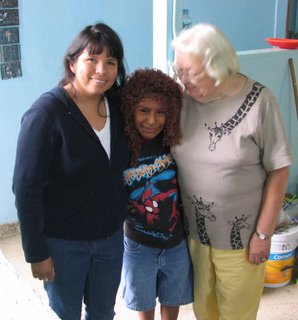
Shirley and Harriet.
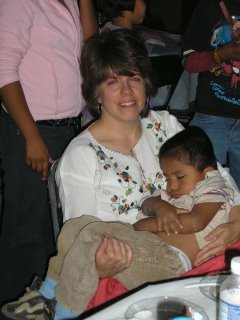
Me with weepy eyes from saying 'goodbye'.

Lynn, trip director.

Sheila.
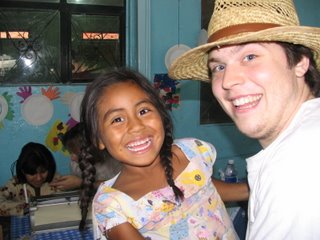
Lucas.
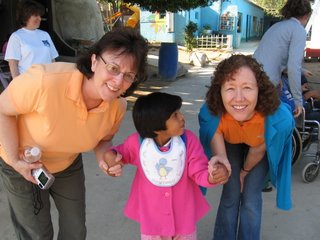
Debbie and Judy.

David.
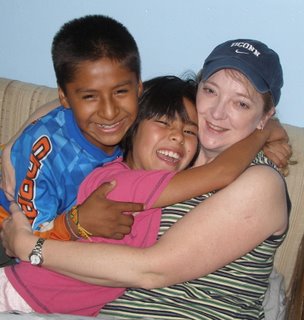
Cindy.

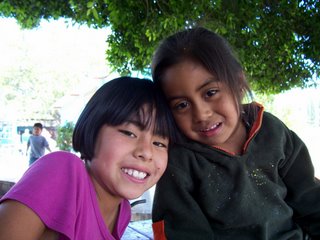
Dios te bendiga, mis amigos. Gracias e adios.
Tuesday, June 13, 2006
Language

On the last leg of our flight to Oaxaca, we were on a regional jet with only one flight attendant. We could tell she was from Texas; she had that twang goin' on. The Houston/Oaxaca flight is a back and forth shuttle; about as common as New York/Washington D.C. but with not as much regularity. About the one thing you can count on is that some folks on that plane will be speaking Spanish as a first, perhaps only, language. So you would think that it would be a job requirement for crew members to speak at least passable Spanish. First, we were all a bit shocked at her pronunciation of Oaxaca ("oh-ah-haa-ka"). Then, when she was handing out sandwiches (turkey or ham), she asked a Spanish-speaking passenger "Paa-vo or haa-mo" which should have been "Pavo o hamon", the "h" remaining silent. This then became the joke of our week, adding more words to this Texas-twang Spanish lexicon: sinko de may-yo, gray-see-as, poor fay-ver, con kay-so. I think it helped us relieve our anxiety about our lack of Spanish as much as it was just plain stupid. Plus, Texas just seems like one big target to most folks.
The very existence of language, spoken or written, is divisive. If you can't speak the language, if you don't know the 'lingo', then you're out. Even if you speak the same ethnic or national language, there's jargon, colloquialisms, culture, slang, dialect, accents, and code words to contend with. In groups we use these as a type of shorthand; a way of defining identity to bolster the group consciousness. Eventually it becomes the language of those who are 'in', and if we are trying to increase group membership, we spend a tremendous amount of time and effort (but not really enough) to indoctrinate the newbies into the glossary of terms.
Take churches, for example. Do you know what a narthex is? Or the chancel? How about acolyte, doxology, scapula, chasuble, polity? It has been recommended that churches stop using words only used in church and choose a common language, one that is spoken outside the church as well as inside, so as to welcome unchurched folks into their midst. Some people resist this because then the church becomes more like an auditorium or concert hall than a church, a sacred place. At the church where I worship, we do not call it a sanctuary but a meetinghouse, which goes back to our Puritan forebears. The space is made holy by what we do there, thus any space, any place can be made holy (or not) by what we do, what language we speak.
Yesterday evening I was watching my 6-yr. old daughter play kickball with the rest of her classmates against another 1st grade class. I noticed the boys knew the language and rules of the game while the girls had to catch on. Of course this made perfect sense; many of these boys play little league and/or go to or watch baseball games with their fathers. I wondered why no one spends enough time teaching girls the same language; after all, baseball is our national pastime. But then it hit me: none of them will grow up to play professional baseball. There's softball available to them, sure, but it's not the multi-billion dollar business that baseball is. I discussed this with my husband as we watched the game; I could hear just the slightest edge of defensiveness in his voice, but perhaps that was a cover for the sorrow over what this meant for his daughters. It's tough for any 'in' group to admit they've kept people out, even if it was unwittingly.
I think there's a time and place for men to have their own language and meanings and for women to have the same, and to be exclusive for a while, to take a break from the Mars/Venus shuttle run. It's when it becomes divisive and systematically exclusive that we then create more distance and the need for a space shuttle just so we can communicate. None of us knows everything; we're all in need of learning, thus gaining the humility we need to teach what we do know.
Whatever language we speak, even if it is the most eloquent, if we do so without love, we all sound like a noisy gong or a clanging cymbal, says the apostle Paul. The move to unify our nation under English is without love. Joking about a working woman's twangy Texan Spanish was without love. Not learning enough Spanish before we left was without love. Some of the most loving moments I lived in during our mission trip and throughout my life are those when hardly a word was spoken. Sometimes, words are just not enough.
Saturday, June 10, 2006
Communion
It was Wednesday, the middle of our trip; it became the pivot upon which our week turned. I spent the morning putting sealant on the concrete dome-shaped computer lab with Cindy, a mom in our group, and some of the kids. After we finished I went into the room where the weekday morning prayer/Bible study led by Francisco, one of the directors, was being held. My Spanish is minimal but his wife Carol, mindful of this, translated for me. It was good just to sit and sing and listen to some songs in Spanish, and meditate in my own way.
When prayers were over, it was time to board the bus for our noontime mission and afternoon excursion. The kids and staff had prepared over 100 ham and cheese sandwiches plus a huge container of punch for us to take to the workers and residents of the Oaxacan city dump. There are 40 or so families who live and work there, culling recyclable plastic bottles from the mountains of garbage. They bundle up the plastic, load it on trucks, and it is then sold to a Mexican mafia who pays them about 400 pesos (40 dollars) for the week's work: 10 pesos (1 dollar) per family. Some of their food they scavenge from their findings. They work from sunrise to sunset, in 80+ heat, surrounded and permeated by the stench of rotting garbage. Imagine some of the worst stuff they could find, and they have found it and probably worse: medical waste, including syringes, dead animals, smells so bad they could be seen escaping from the just-ripped plastic bags.
This work of delivering lunches to these resident workers twice a week is a mission of the orphanage; the children fight over who gets to make the sandwiches and then deliver them to the folks at the dump. Children who are the recipients of mission also get to give to others so they see themselves as having something to give and so to share with others. But this week the children are grounded because of misbehaving, so it is up to our group and a group of college kids that have also been working at Casa Hogar this week to deliver lunch.
We have been told by Bryan (see Simply Smiles) that these people, upon introduction, might offer us their arms instead of their hands because of how dirty and bacteria-ridden they are. He urges us to shake their hands anyway. For Jesus there were no 'untouchables'; only people in need of human connection. We stop on the way to buy a huge sack of oranges to augment the meal. The trip takes about 30 minutes; the dump announces itself in its usual way. We pass by corrugated tin shacks that house these families and others; no running water, no electricity. We pull into a no-longer-used sorting station that gives us and the workers some shade to visit in. They see the bus and come in a few at a time, hestitant at first but then I get a sense of hospitality as they open their home to us.
I help dole out the cold drinks in plastic cups, giving a smile to substitute for a greeting in my crude Spanish. Then we grab the bags of sandwiches and oranges and hand these out. Soon everyone is digging in. I go and sit with a young girl, maybe 5 or 6, and her little sister, who seems to be about 2 or 3. I figure the little one's Spanish is about the same as mine, so I am in good company. She takes her sandwich apart and hands the half with ham to her big sister; she then proceeds to take pieces of the string cheese off the bread and eat them. Like any mother, I suppose, I start to make yummy sounds and rub my tummy as if to say "that must taste good." Instead she interprets my gestures as signs of hunger, peels off a piece of cheese and hands it to me.
Her hands are grimy and so are mine. I hesitate for only a nanosecond; what can I say...no, thank you? I take the cheese in my fingers and put it in my mouth, smiling at her, careful not to let the tears rise. And I think in some small way, she smiled back.
I have had Communion in more ways than I can count. I've had wafers, white bread, wheat, pita, little shortbread squares, and shortcake biscuits; Oreos and milk; crackers and grape jelly; I've had grape juice, red wine, and whatever awful searing stuff Catholics serve. I've been in all kinds of places: cathedrals, churches, camps, mission trips, retreats, the ocean, the mountains, the city, suburbia, rural town, in other countries, even on an airplane. It's been served all kinds of ways: in the pew, at the railing, by intinction (rip and dip, as we said in seminary), in a circle, at a table; in little cups (glass and plastic), on silver and brass plates, glass pitcher and goblet, stoneware, paper plates and cups, on an antique wooden tray with spindles to hold the tiny glass cups in place. I've served, and been served by, all kinds of people: men, women, children, teenagers, priests, ministers, laypeople, even served by a pregnant woman once, which I thought was meaningful on several levels, considering it was a Catholic retreat center.
But it has never meant as much to me as it did that Wednesday afternoon in the Oaxacan city dump, served to me by a little girl with filthy hands and an open heart in a place ridden with decay. Outside of marriage, it was the purest moment of Communion I've ever experienced. God does not waste anything, including people. We may do that to be certain, but through that little girl, God was visible, incarnate, real.
Whenever you do this, remember me, Jesus said. Remember love, remember compassion, remember sacrifice, remember grace and life and forgiveness and justice and peace. And whenever I take communion or serve it, I'll remember her, too.
